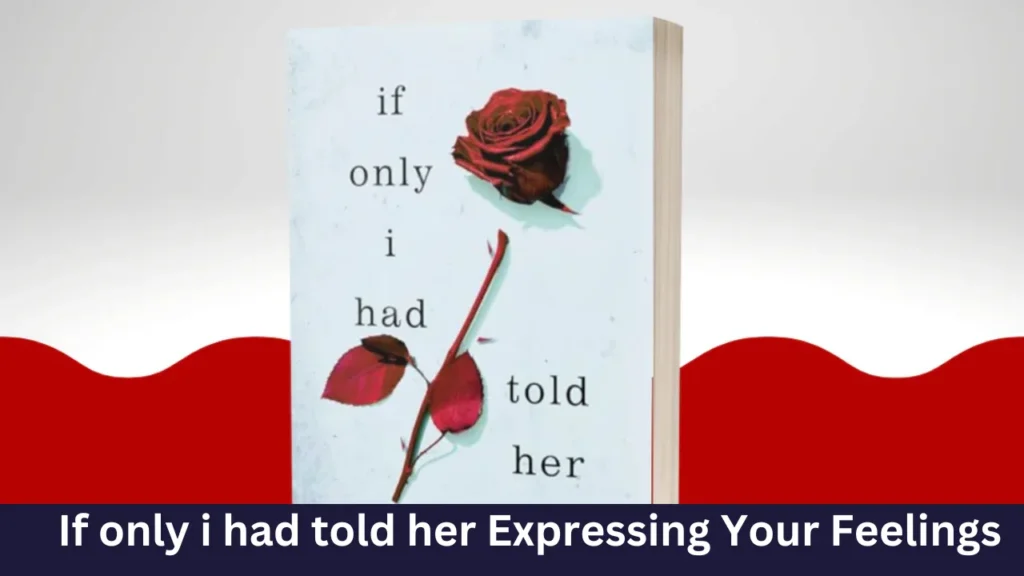If Only I Had Told Her Regret And Missed Opportunities

Regret is a common feeling that many people experience, especially when they reflect on moments where they wish they had spoken up or acted differently. One of the most common thoughts that comes to mind in these situations is if only I had told her. These six words carry a heavy weight, often signifying missed opportunities for communication, connection, or even closure. In this article, we will explore the significance of this phrase, its emotional impact, and the importance of effective communication in relationships.
What is if only i had told her
If only I had told her is a phrase often associated with regret and missed opportunities for communication. It reflects a situation where someone wishes they had expressed their feelings, thoughts, or important information to a person, but for various reasons—fear, hesitation, or procrastination—they didn’t. This unspoken expression can lead to feelings of remorse, as the individual realizes too late that their silence may have impacted their relationship or the outcome of a particular situation. The phrase highlights the importance of timely and honest communication in relationships.
If only i had told her Expressing Your Feelings

Human relationships are built on communication. Whether it’s a simple “thank you” or a deeper “I love you,” our words can convey emotions, intentions, and meanings that strengthen bonds between people. If only I had told her can often be the result of avoiding these conversations due to fear, insecurity, or the assumption that there will always be more time. When feelings are left unsaid, misunderstandings can arise, and relationships can become strained.
Communication doesn’t just apply to romantic relationships. Whether it’s with a friend, family member, or colleague, sharing your thoughts openly can prevent future regrets. Many people look back on their lives and think, how much she meant to me,” or how her actions hurt me.” These unspoken words can leave emotional gaps, creating unresolved feelings that linger for years.
How Fear Stops Us from Speaking Up
Fear plays a significant role in preventing people from sharing their true feelings. The fear of rejection, the fear of not being understood, or the fear of causing conflict can all lead to silence. In some cases, people convince themselves that it’s easier to remain quiet rather than risk a negative outcome. This avoidance, however, often leads to the very regret we wish to avoid.It can become a haunting phrase, as we realize that silence did not protect us from pain; it only prolonged it.
By not expressing how we feel, we give power to our fears rather than addressing them. It’s important to remember that while conversations can be difficult, they can also provide relief and resolution. Even if the outcome isn’t what we hope for, speaking our truth helps us avoid the painful weight of wondering, “what if?”
Timing Is Everything
Another common reason people hesitate to communicate is the belief that there will always be a “better time” to have important conversations. But life is unpredictable, and waiting for the perfect moment can result in missed opportunities. It is often a reflection of this procrastination, as we find ourselves regretting the time we spent waiting instead of taking action.
In relationships, timing is key, but it’s important not to use it as an excuse for avoiding difficult conversations. Whether it’s expressing love, forgiveness, or even setting boundaries, speaking up when the moment arises can prevent the feelings of regret that come with missed opportunities.
The Emotional Weight of Regret
Regret is a powerful emotion, and if only I had told her can evoke a sense of loss and longing that is difficult to shake. When we reflect on missed opportunities to communicate, we may experience sadness, frustration, and even guilt. This regret can affect our emotional well-being, making it harder to move on from past situations.
For instance, many people regret not telling a loved one how much they cared before it was too late. In cases of loss or separation, the chance to express these emotions may never come again, leaving a lasting void. If only I had told her in these circumstances can lead to deep emotional wounds, making it all the more important to seize the moment and communicate openly while we still can.
Moving Forward
To avoid the regret of if only I had told her, it’s essential to practice open and honest communication in all aspects of life. Here are some tips for ensuring that you don’t leave important words unsaid:
Be honest with yourself:
Before you can communicate with others, you must first understand your own feelings. Take time to reflect on what you truly want to say and why it matters to you.
Don’t wait for the perfect moment:
As mentioned earlier, waiting for the “right time” can result in missed opportunities. Instead of procrastinating, take action when you feel the need to speak.
Prepare for different outcomes:
Sometimes, conversations don’t go as planned. Be ready for the possibility that your words may not be received as you hoped, but remember that speaking up is still better than staying silent.
Practice empathy:
When sharing your feelings, consider the other person’s perspective. Understanding their emotions and needs can lead to more meaningful and productive conversations.
Start small:
If you find it difficult to express deeper emotions, start with smaller conversations. Gradually build your confidence in sharing your thoughts and feelings openly.
Healing from Regret
Even if you find yourself thinking if only I had told her, it’s important to remember that regret is a natural part of life, and it doesn’t have to define you. While you can’t change the past, you can learn from it and use these lessons to improve future communication. Acknowledging your regrets can be the first step toward healing.
In some cases, it’s possible to revisit the conversation you wish you had earlier. Reaching out to the person you regret not communicating with can offer closure or even strengthen your relationship. If that’s not possible, writing a letter to express your unspoken feelings—even if you never send it—can provide emotional release.
The Role of Communication in Healing Relationships
Communication is a powerful tool in healing relationships. Whether it’s an apology, an expression of love, or setting boundaries, words have the power to repair what was once broken. If only I had told her is a reminder that open communication can prevent misunderstandings and foster stronger, more meaningful connections.
When relationships are strained, avoiding tough conversations can lead to more distance and unresolved emotions. Instead, addressing the issues head-on can create an opportunity for healing and growth. It’s never too late to speak your truth, and the relief that comes from doing so can far outweigh the fear that once held you back.
Frequently Asked Questions
What does If only I had told her mean?
It refers to a feeling of regret for not expressing thoughts or feelings to someone when there was an opportunity, often leading to missed chances for connection or resolution.
How can I avoid saying If only I had told her?
You can avoid this regret by practicing open and honest communication, expressing your emotions and thoughts in the moment instead of holding them back out of fear or hesitation.
Why do people often feel regret with If only I had told her?
People feel regret because they realize too late that their silence may have led to misunderstandings, missed opportunities, or unresolved emotions, which could have been avoided with honest communication.
Final Thoughts
In life, we are often presented with opportunities to communicate our thoughts, feelings, and emotions. If only I had told her serves as a reminder of the importance of seizing these moments before they slip away. By practicing open communication, embracing vulnerability, and letting go of the fear of rejection, we can avoid the pain of regret and build stronger, more fulfilling relationships.





